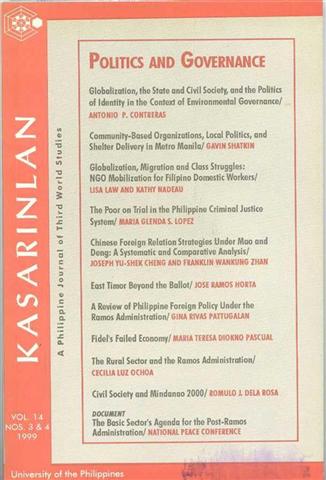Community-Based Organizations, Local Politics and Shelter Delivery in Metro Manila
Abstract
Adequate housing has been a perennial problem in Metro Manila. The past three administrations failed to gain significant ground in solving this. Decentralization promised the more efficient delivery of basic services, particularly to illegal settlements existing in politically significant numbers in the employment-rich areas of Metro Manila. Meanwhile, community-based organizations (CBOs) have become important actors in community improvement efforts. Although successful in bargaining with government to prevent demolition and legalize land tenure, CBOs continue to face tremendous obstacles, including factionalism within the communities themselves and the controlling tendencies of non-government organizations, in confronting the housing problem. It does not help that local governments, often without the political will to commit necessary resources in finding solutions to the housing issues, perceive CBOs as counterproductive elements and not as organizations that represent citizens whose inadequate shelter are constantly under the threat of demolition. The author suggests a closer look at the decentralized system of addressing the housing needs of the urban poor as well as the role of civil society in bringing access to adequate housing closer to those who need it.
Published
2009-07-28
How to Cite
SHATKIN, Gavin.
Community-Based Organizations, Local Politics and Shelter Delivery in Metro Manila.
Kasarinlan: Philippine Journal of Third World Studies, [S.l.], v. 14, n. 3, july 2009.
ISSN 2012-080X.
Available at: <https://journals.upd.edu.ph/index.php/kasarinlan/article/view/1413>. Date accessed: 30 aug. 2025.
Section
Features
By submitting a manuscript, the authors agree that the exclusive rights to reproduce and distribute the article have been given to the Third World Studies Center.



